Victoria International Airport | |||||||||||||||||||
|---|---|---|---|---|---|---|---|---|---|---|---|---|---|---|---|---|---|---|---|
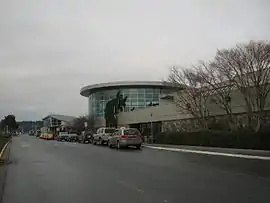 | |||||||||||||||||||
| Summary | |||||||||||||||||||
| Airport type | Public | ||||||||||||||||||
| Owner | Transport Canada[1] | ||||||||||||||||||
| Operator | Victoria Airport Authority | ||||||||||||||||||
| Serves | Victoria, British Columbia | ||||||||||||||||||
| Location | North Saanich, British Columbia | ||||||||||||||||||
| Time zone | PST (UTC−08:00) | ||||||||||||||||||
| • Summer (DST) | PDT (UTC−07:00) | ||||||||||||||||||
| Elevation AMSL | 64 ft / 20 m | ||||||||||||||||||
| Coordinates | 48°38′50″N 123°25′33″W / 48.64722°N 123.42583°W | ||||||||||||||||||
| Website | www.victoriaairport.com | ||||||||||||||||||
| Map | |||||||||||||||||||
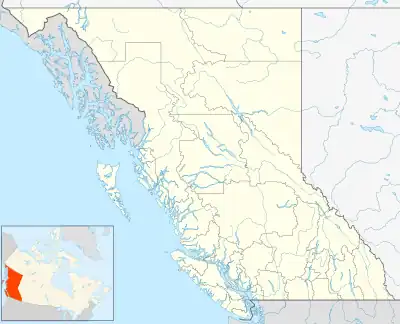 CYYJ Location in British Columbia 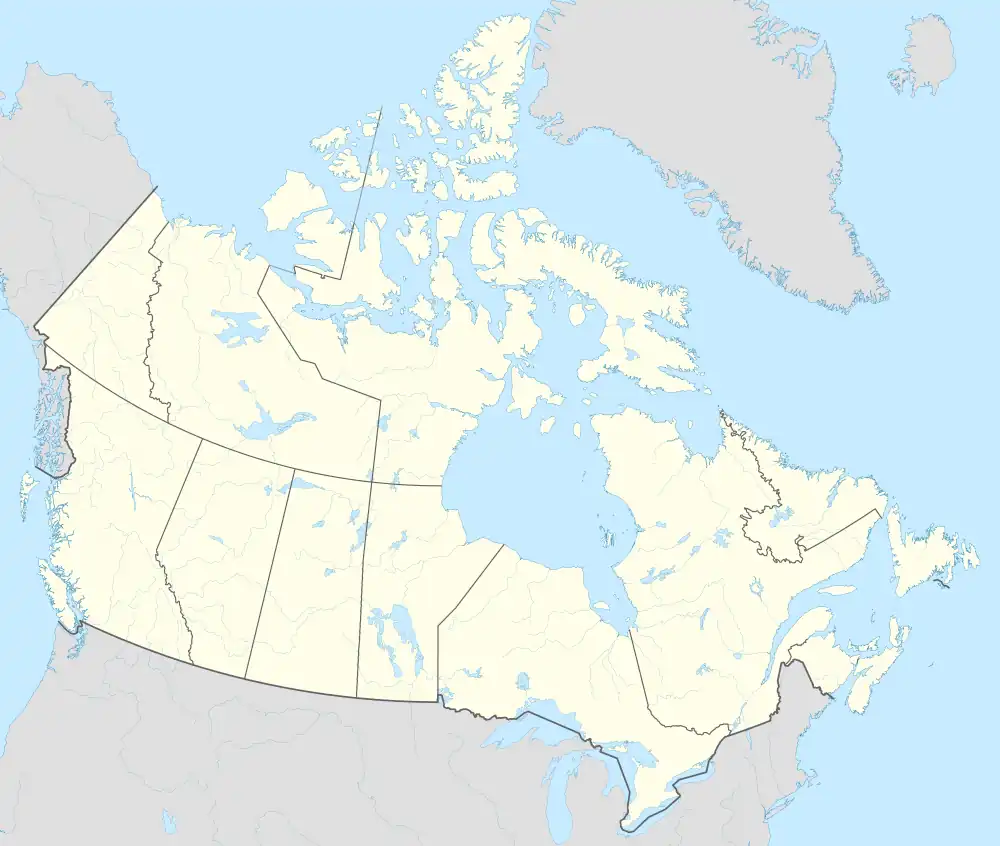 CYYJ CYYJ (Canada) | |||||||||||||||||||
| Runways | |||||||||||||||||||
| |||||||||||||||||||
| Statistics (2021) | |||||||||||||||||||
| |||||||||||||||||||
Sources: Canada Flight Supplement[2] Environment Canada[3] Victoria Airport Authority Facts & Stats[4] | |||||||||||||||||||
Victoria International Airport (IATA: YYJ, ICAO: CYYJ) serves Victoria, British Columbia, Canada. It is 12 nautical miles (22 km; 14 mi) north northwest[2] of Victoria on the Saanich Peninsula, with the bulk of the airport (including the passenger terminal) in North Saanich, and a small portion of the airfield extending into Sidney. The airport is run by the Victoria Airport Authority. YYJ has many nonstop daily flights to Vancouver International Airport (YVR, about 15 minutes), which is a major airport serving many global routes. Additionally, Victoria International has nonstop service to Seattle (SEA), Toronto (YYZ), Montreal (YUL, summer only), Calgary (YYC), Edmonton (YEG), and several smaller cities in British Columbia and Yukon.[5] The airport also has seasonal (late fall to early spring) nonstop service to several Mexican resort destinations.[5] Non-stop service between Victoria and the United States decreased by 50% at the beginning of September 2019 when Delta Airlines permanently ended its three daily flights to Seattle, after which only Alaska Airlines continued to fly the route.[6]
Victoria International Airport is classified as an airport of entry by Nav Canada and is staffed by the Canada Border Services Agency (CBSA). CBSA officers at this airport can handle aircraft with no more than 450 passengers, when unloaded from the aircraft in stages, or 120 normally.[2] YYJ does not have United States customs and border preclearance, but many passengers fly first to Vancouver International Airport (YVR), which does have U.S. preclearance.
In 2018, YYJ served 2,048,627[4] passengers and had 120,936[4] aircraft movements, making it Canada's 11th busiest airport in terms of passengers. It was British Columbia's third busiest airport in terms of passengers and aircraft movements.
Like most airports that are run by local authorities in Canada, YYJ charges an airport improvement fee for each outgoing passenger. As of December 2018, it was $15.00 per departing passenger.[7] AIF fees are usually added to fares and collected automatically by most airlines.
History
The airport started in 1939 as a grass strip, and was used as a military training airfield.[8] During the early part of WWII (1940 - 1941), the airfield was used as Royal Air Force Station Patricia Bay, for training personnel for basic flying training, preparatory to returning them to the UK.
In approximately 1942 the aerodrome was listed as RCAF Aerodrome - Patricia Bay, British Columbia at 48°39′N 123°26′W / 48.650°N 123.433°W with a variation of 24 degrees east and elevation of 25 ft (7.6 m). The aerodrome was listed with three runways as follows: [9]
| Runway name | Length | Width | Surface |
|---|---|---|---|
| 13/31 | 5,000 ft (1,500 m) | 200 ft (61 m) | Hard surfaced |
| 8/26 | 5,000 ft (1,500 m) | 200 ft (61 m) | Hard surfaced |
| 2/20 | 5,000 ft (1,500 m) | 200 ft (61 m) | Hard surfaced |
The airport is located beside Patricia Bay, which, due to the prevalence of flying boats at the time, proved to be an excellent location. The Department of Transport took over the airport in 1948. It was then called Victoria (Patricia Bay) Airport, and many locals still refer to it as the "Pat Bay Airport". Trans-Canada Airlines (later Air Canada) began regular service in 1943.
The last Royal Canadian Air Force (RCAF) unit left the airport in 1952. In the late 1980s the RCAF returned to the property when 443 Helicopter Squadron began operating CH-124 Sea King ship-borne anti-submarine helicopters from Victoria International Airport. The RCAF refers to 443 Squadron operations at the airport as the Patricia Bay Heliport. The unit converted to the Sikorsky CH-148 Cyclone in 2018.
In 1959, the airport was renamed the "Victoria International Airport".
In 1997, as part of a broad scale restructuring of airports across Canada, Transport Canada (formerly the Department of Transport), gave operational control of the airport to the Victoria Airport Authority.
In 2000, the Victoria Airport Authority began the process of renovating and expanding the terminal to meet passenger needs. In 2002, the new "airside hold room" and the new "arrivals rotunda" were rebuilt. By 2005, the new "departures area" was completed.
CRJ-200N423SW_YYJDecember2018.jpg.webp)
In May 2005, the federal government, which owns the land, announced a reduction in the rent paid by the Victoria Airport Authority. This will save $0.6 million Canadian each year and $12 million CAD over the life of the lease, which is 50 years.
In July 2016, Westjet Airlines announced that they would be permanently ending service to Honolulu from Victoria. The non-stop route had started in 2009 and had ended due to the lack of demand.[10]
In September 2018, United Airlines announced that the daily United Express flight from Victoria to San Francisco would permanently end on January 7, 2019, concluding over a decade of daily non-stop service between the two cities.[11]
In March 2019, Delta Air Lines announced that all Delta flights from Victoria to Seattle would permanently end on September 2, 2019,[6] concluding a three-year presence by the airline in Victoria and leaving Alaska Airlines as the only airline serving Victoria directly from Seattle or anywhere in the United States. Delta was the second airline to leave Victoria that year, after United Airlines withdrew service in January 2019.[11]
Terminal
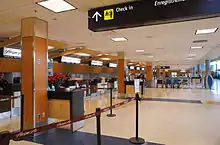


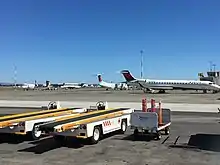
The main terminal has ten gates, organized as gates 3–4, 5–11, and 12–13. Gates 3-4 and 12-13 are equipped with aircraft loading bridges.[12]

There are three luggage carousels: two located at the arrivals area for domestic passengers, and one for international flights located inside the customs area.
As of December 1, 2010,[13] time limited, ad supported[14] Wi-Fi internet service provided by Telus is available terminal wide.[15]
Airlines and destinations
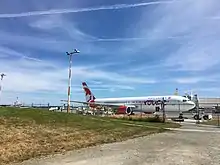
Nearly all commercial flights at Victoria fly either to Canadian domestic airports or to Seattle. Seasonal scheduled flights by WestJet connect Victoria to tourist destinations in Mexico. For the Summer 2017 season, Air Canada Rouge operated wide-body Boeing 767s on its daily flights to Toronto[16][17]
Passenger
| Airlines | Destinations |
|---|---|
| Air Canada Express | Vancouver |
| Air Canada Rouge[18] | Toronto–Pearson Seasonal: Montréal–Trudeau |
| Air North | Vancouver, Whitehorse |
| Alaska Airlines | Seattle/Tacoma |
| Flair Airlines | Seasonal: Calgary, Edmonton, Las Vegas (begins February 16, 2024),[19] Toronto–Pearson |
| Kenmore Air | Everett, Friday Harbor, Seattle–Boeing[20] |
| Lynx Air | Calgary (ends March 29, 2024)[21] |
| Pacific Coastal Airlines | Kamloops,[22] Kelowna, Prince George, Vancouver |
| Porter Airlines | Toronto–Pearson[23] |
| WestJet | Calgary, Edmonton Seasonal: Cancún, Las Vegas (begins February 1, 2024),[24] Puerto Vallarta, San José del Cabo,[25] Winnipeg |
| WestJet Encore | Calgary, Edmonton, Kelowna, Vancouver |
| Map of North American passenger destinations |
|---|
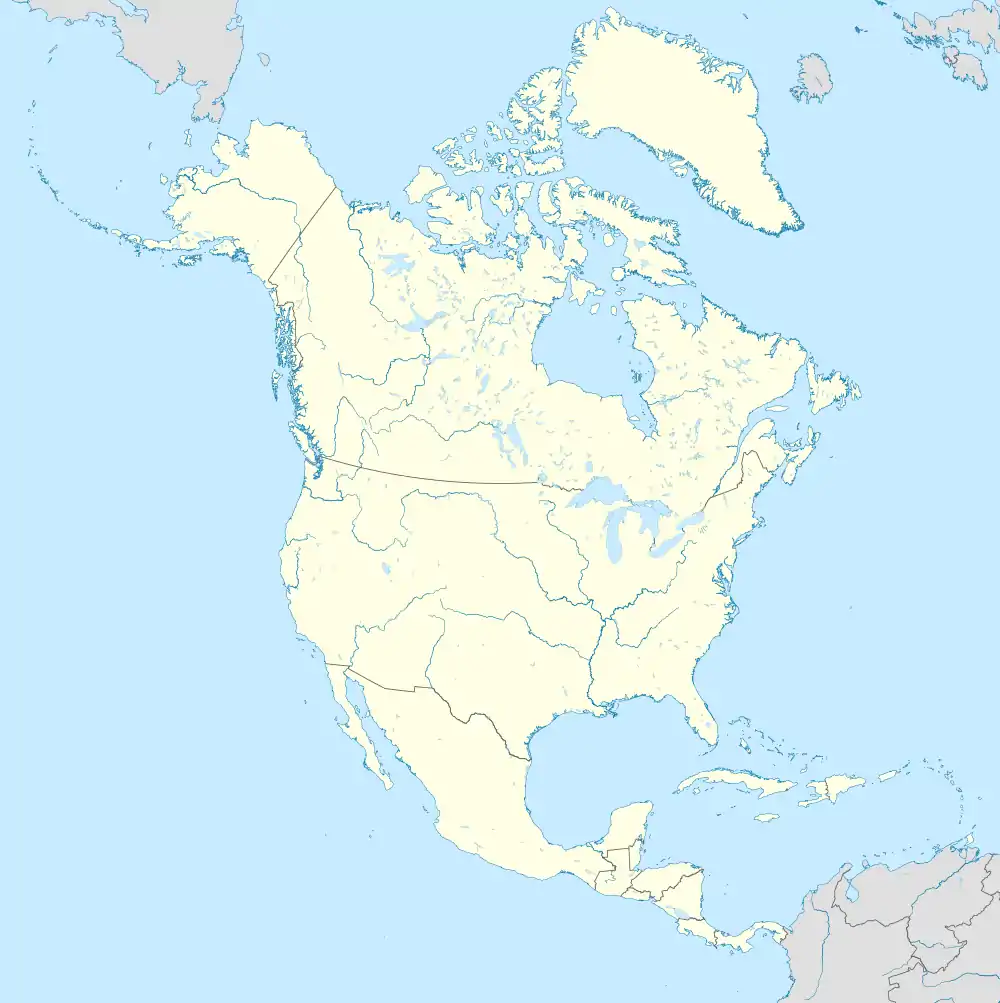 Victoria Destinations from Victoria International Airport Red = Year-round destination Green = Seasonal destination Blue= Future destination |
Cargo
| Airlines | Destinations |
|---|---|
| FedEx Express | Vancouver |
| KF Cargo | Vancouver |
| Morningstar Air Express | Vancouver |
| SkyLink Express | Vancouver |
Statistics
Annual traffic
| Year | Passengers | % change |
|---|---|---|
| 2010 | 1,514,713 | |
| 2011 | 1,499,792 | |
| 2012 | 1,504,024 | |
| 2013 | 1,556,960 | |
| 2014 | 1,650,904 | |
| 2015 | 1,710,825 | |
| 2016 | 1,856,421 | |
| 2017 | 1,934,842 | |
| 2018 | 2,048,627 | |
| 2019 | 1,924,385 | |
| 2020 | 574,874 | |
| 2021 | 673,748 | |
| 2022 | 1,490,039 | |
Development plans
The Victoria International Airport Master Plan 2023-2024 lays out the long-term development and future plans of the airport.[26] The Master Plan highlights future infrastructure growth for the airport in two phases, 2023-2032 and 2033-2042.
2023 - 2032

Airfield
Terminal
- Eastern expansion to support demand growth for aircraft gates, check-in area, outbound baggage system and offices
- Western expansion to support demand growth for aircraft gates, international/CBSA facilities, and inbound baggage system
- Central expansion to support demand growth for pre-board screening
Landside
- Expanded Electra Boulevard and development of a roundabout at the new intersection with Willingdon Avenue
- Parking expansion at the terminal building to support demand growth
- Ongoing improvement to the recreational path and supporting areas
Commercial
- Leasing of commercial lots that are readily available
- Improvements to infrastructure to make additional lots available as required by demand
2033 - 2042
Airfield
- Apron IV expansion to support demand growth
- Closure of Runway 03-21 to enable growth of the terminal building and Apron IV
- Northern taxiway development to support demand for airside commercial lots
Terminal
- Western expansion to support demand growth for aircraft gates
Landside
- Parking expansion at the terminal building to support demand growth
- Ongoing improvement to the recreational path and supporting areas
Commercial
- Increased land availability due to closure of Runway 03-21
- Leasing of commercial lots that are readily available
- Improvements to infrastructure to make additional lots available as required by demand
Flight training
There are several organisations that offer flight training at the airport:
- Ocean Air Floatplanes (charter service, tours, float plane training using Cessna 180H)
- Victoria Flying Club (small prop aircraft training, charter service, float plane, Multi-engine IFR Training, Red Bird Simulator)
- Royal Canadian Air Cadets
Transportation to the airport
Victoria International Airport is 22 km from downtown Victoria.
It is served by taxi (Yellow Cab).
BC Transit routes 87 and 88 make connections to the airport.[27] Passengers using BC Transit can connect with intercity (IslandLink Bus, or Tofino Bus Services) and regional coach service (Pacific Coach Lines) in Victoria.
By car, the airport is normally a 20-minute drive from downtown Victoria (with little or no traffic, and a 40-minute drive with traffic) via Highway 17. The airport has short term and long term/daily parking lots next to the terminal with an additional overflow lot. Rental lot is located to the southwest of the terminal building.
A new interchange at Highway 17 and McTavish Road, the main highway access point to the airport, was completed in April 2011. Funding for the interchange was shared between the federal, provincial governments and Victoria Airport Authority.[28]
Fire and rescue
Victoria International Airport Fire and Rescue operates three crash tenders and one support vehicle to deal with emergencies at the airport. The current station (Airport Fire Service and Airport Operations) opened in 2010 to replace the former station dating back to World War II.[29]
Fixed-base operations
- Shell Aerocentre
- Vancouver Island Helicopters (VIH)
- Viking Air
See also
- British Columbia Aviation Museum
- List of airports in Greater Victoria
- Victoria Airport Water Aerodrome, adjacent to Victoria International Airport, seaplanes only
- Victoria Harbour (Camel Point) Heliport, helicopters only, adjacent to cruise ship terminal near downtown Victoria
- Victoria Inner Harbour Airport, downtown Victoria, seaplanes only
References
- ↑ "List of airports owned by Transport Canada". Archived from the original on 3 April 2019. Retrieved 15 April 2019.
- 1 2 3 Canada Flight Supplement. Effective 0901Z 16 July 2020 to 0901Z 10 September 2020.
- ↑ Synoptic/Metstat Station Information Archived June 27, 2013, at the Wayback Machine
- 1 2 3 4 "Victoria Airport Authority Facts & Stats". Archived from the original on 30 December 2017. Retrieved 16 January 2018.
- 1 2 "Non-Stop Destinations". Victoria International Airport. Archived from the original on 15 December 2018. Retrieved 11 December 2018.
- 1 2 Duffy, Andrew. "Delta Airlines pulls service from Victoria International Airport". Times Colonist. Archived from the original on 2019-04-10. Retrieved 2019-08-09.
- ↑ "Victoria International Airport". Victoria International Airport. Archived from the original on 8 December 2018. Retrieved 11 December 2018.
- ↑ British Columbia Aviation Museum Archived March 6, 2009, at the Wayback Machine
- ↑ Staff writer (c. 1942). Pilots Handbook of Aerodromes and Seaplane Bases Vol. 2. Royal Canadian Air Force. p. 146.
- ↑ "WestJet cancels Victoria-Hawaii direct flights, cites low demand". Victoria Times Colonist. Retrieved 2022-08-19.
- 1 2 Wilson, Carla. "United Airlines axing Victoria-San Francisco flight". Times Colonist. Archived from the original on 2018-09-17. Retrieved 2018-09-17.
- ↑ "Terminal Map" (PDF). Victoria International Airport. Retrieved May 5, 2022.
- ↑ Victoria International Airport (YYJ) - Free Wireless Internet Arrives! - News Archived January 22, 2012, at the Wayback Machine. Victoriaairport.com (December 1, 2010). Retrieved on July 12, 2013.
- ↑ Victoria Airport partners with BOLDstreet. Wings Magazine (2011-01-31). Retrieved on 2013-07-12.
- ↑ Victoria International Airport (YYJ) - Services & Facilities Archived 2012-01-23 at the Wayback Machine. Victoriaairport.com. Retrieved on 2013-07-12.
- ↑ "Air Canada to offer daily Victoria-Toronto flights on Boeing 767". Vancouver Island. 2017-02-15. Archived from the original on 2017-03-10. Retrieved 2017-07-10.
- ↑ "282-passenger 767-300 wide-body jet returns for Victoria-Toronto flights in 2019". Citified. 2018-11-14. Archived from the original on 2019-04-03. Retrieved 2019-04-03.
- ↑ "Timetable" (PDF). Air Canada. Retrieved 16 October 2023.
- ↑ "Flair Airlines NW23 Network Expansion – 01AUG23". Aeroroutes. Retrieved 2 August 2023.
- ↑ "Kenmore Air Adds Victoria to their Paine Field Flight Schedule". Everett Post. May 24, 2023. Retrieved May 24, 2023.
- ↑ "Lynx Air NS24 Preliminary Service Changes - 05 Nov 23". Aeroroutes. Retrieved 20 November 2023.
- ↑ "Pacific Coastal Airlines Expands Service with New Route Between Victoria and Kamloops". Pacific Coastal Airlines. July 17, 2023. Retrieved July 17, 2023.
- ↑ "Porter Airlines expands presence in British Columbia with service between Victoria and Toronto Pearson". Newswire. June 27, 2023. Retrieved June 27, 2023.
- ↑ "WestJet announces transborder connectivity between Victoria and Las Vegas". WestJet. Retrieved September 20, 2023.
- ↑ "WestJet NW23 Network Additions". Aeroroutes. Retrieved 23 July 2023.
- ↑ "YYJ Master Plan 2023-2042" (PDF). Victoria International Airport. Retrieved 20 November 2023.
- ↑ "BC Transit will offer more frequent service to Victoria International Airport". Victoria Buzz. 2018-08-20. Archived from the original on 2018-09-24. Retrieved 2018-09-24.
- ↑ BC Ministry of Transportation and Infrastructure McTavish Interchange Project Archived December 13, 2009, at the Wayback Machine
- ↑ "Victoria International Airport". Archived from the original on 4 March 2016. Retrieved 10 August 2015.
External links
- Victoria International Airport (official site)
- Victoria International Airport Archived 2012-06-15 at the Wayback Machine on COPA's Places to Fly airport directory
- Past three hours METARs, SPECI and current TAFs for Victoria International Airport from Nav Canada as available.
Onsite operators
- Victoria (CYYJ) Shell Aerocentre private aircraft, private jet charters.
- VIH Aviation Group, helicopter services, private jet charters.
- Viking Air De Havilland, firefighting, aerial surveillance.